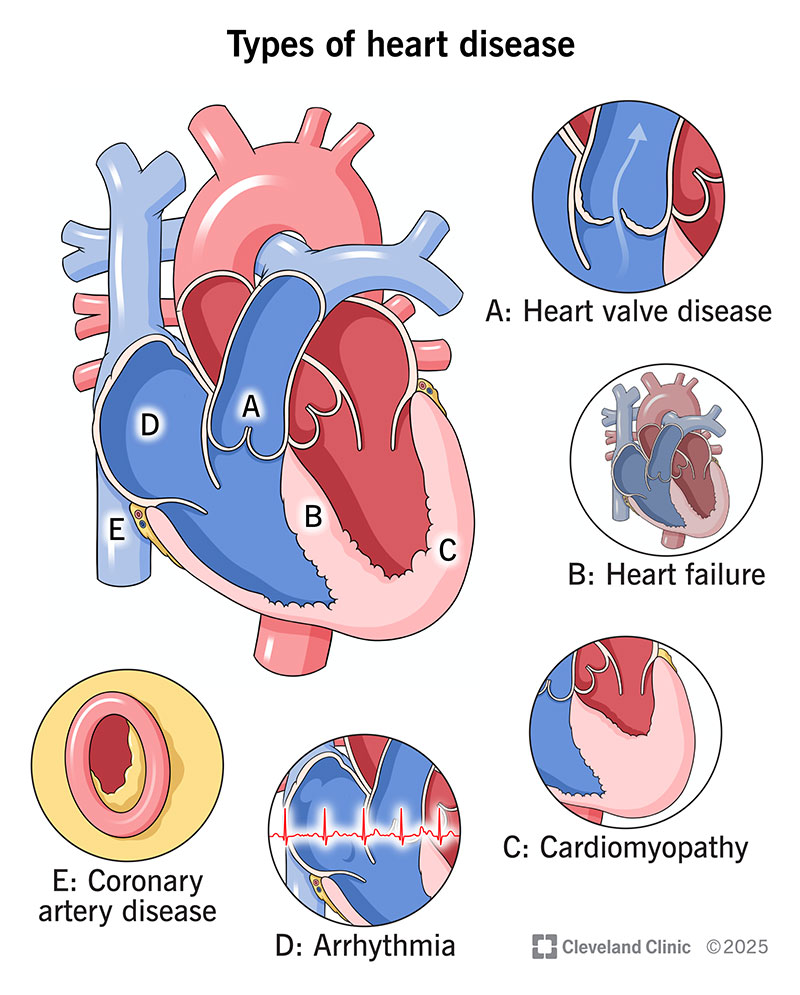Heart disease includes many diseases that affect your heart, but coronary artery disease (CAD) is the most common and familiar one. Heart disease can lead to a heart attack, heart failure, cardiac arrest, stroke and organ damage. Healthy habits, medicines and procedures can prevent or treat CAD and other heart diseases.
Advertisement
Cleveland Clinic is a non-profit academic medical center. Advertising on our site helps support our mission. We do not endorse non-Cleveland Clinic products or services. Policy

Image content: This image is available to view online.
View image online (https://my.clevelandclinic.org/-/scassets/images/org/health/articles/24129-heart-disease-illustration)
Heart disease describes a variety of issues that can affect your heart. Coronary artery disease (CAD) is the most common type. CAD, also known as coronary heart disease, can make your arteries narrow and lead to a heart attack. Heart disease can also affect your heart muscle, valves or electrical system. The symptoms you have and the treatments you get depend on the type of heart disease you have.
Advertisement
Cleveland Clinic is a non-profit academic medical center. Advertising on our site helps support our mission. We do not endorse non-Cleveland Clinic products or services. Policy
When your heart isn’t working well, it has trouble sending enough blood, oxygen and nutrients to your body. In a way, your heart delivers the fuel that keeps your body running. If your heart can’t deliver that fuel, it affects everything your body’s systems do.
Lifestyle changes and medications can keep your heart healthy and lower your chances of getting heart disease.
Heart disease is the top cause of death in the United States in people from most ethnic backgrounds.
Heart disease types include:
The first symptoms of heart disease include chest pain, shortness of breath, swelling in your legs, fatigue and dizziness/fainting. But you can have different signs of heart disease depending on what’s wrong. Heart disease symptoms may include:
Advertisement
Issues with your heart, like muscle scarring or injury or blocked arteries can cause heart disease. Different types of heart disease have different causes. Other causes of heart disease include:
Heart disease may be more likely to happen to you if you have certain risk factors. Risk factors for heart disease include conditions like high cholesterol, high blood pressure, Type 2 diabetes or substance use disorder. You’re also in a high-risk group if you have a BMI (body mass index) higher than 25 (having overweight). Having heart disease in your biological family raises your risk, and so does using tobacco products, being inactive and eating unhealthy foods.
You can lower your risk by managing these conditions, being more physically active, giving up tobacco and eating healthier.
Some types of heart disease can lead to other kinds of heart disease. Complications of heart disease — many of which are life-threatening — include:
A provider can make a heart disease diagnosis after doing a physical exam, hearing about your symptoms and learning about your personal and biological family health history. They’ll also perform diagnostic tests, like:
Heart disease treatments depend on your heart issue. Your healthcare provider may ask you to make changes to your daily life, take medication or have surgery.
Heart disease treatments may include:
Advertisement
Depending on the surgery or procedure you have, your recovery can take a few days to many weeks. You may only need a few days to recover from minor procedures. But you may need two to four weeks to recover from minimally invasive surgery and six to 12 weeks to recover from open-heart surgery.
If you have a biological family history of heart disease, you may want to ask your provider if you have other risk factors. If you do, you can make a plan to help prevent heart disease.
Contact your provider if you have heart disease symptoms. Call your local emergency number if you suddenly experience chest pain, pressure, heaviness or discomfort, fainting or shortness of breath.
You may want to ask your healthcare provider:
Medications and/or procedures can help people who have various types of heart diseases. It’s easier to treat most types of heart disease if you get an early diagnosis instead of waiting for symptoms to get worse. Many people can live full lives when they follow their healthcare provider’s treatment plan.
If you have coronary artery disease (the most common kind of heart disease), you can improve your health by making changes to your daily life. This may include reducing how much salt and saturated fat you eat and increasing how active you are. A provider may also recommend taking medicine to lower your cholesterol and blood pressure.
Advertisement
You can prevent some kinds of heart diseases in these ways:
Your heart has a crucial job, so it’s important to pay attention to warning signs of a heart issue. Many heart diseases develop over time. Identifying heart disease early gives you the best chance of managing it well. Talk with a healthcare provider about the best ways to prevent heart disease or keep it from getting worse. Even if you have risk factors you can’t change, there are other things you have the power to change.
Advertisement

Sign up for our Health Essentials emails for expert guidance on nutrition, fitness, sleep, skin care and more.
Learn more about the Health Library and our editorial process.
Cleveland Clinic’s health articles are based on evidence-backed information and review by medical professionals to ensure accuracy, reliability and up-to-date clinical standards.
Cleveland Clinic’s health articles are based on evidence-backed information and review by medical professionals to ensure accuracy, reliability and up-to-date clinical standards.
When you need treatment for coronary artery disease, you want expert care. At Cleveland Clinic, we’ll create a treatment plan that’s personalized to you.
